Chris Mazdzer
Chris Mazdzer interview: “Put it this way, from June 2015 to June 2018 – so for the last 3 years – there were only three times where I spent more than two weeks in a single location.”
Chris Mazdzer, the first non-European Olympian to win a medal in men’s luge singles, talks about the relentless cycle of training and competing, and how the summer break isn’t really a break at all.
“Even in the summer we’re still working on our sleds and getting our equipment set up for next year.”
For most of us (okay, the entire southern hemisphere notwithstanding) winter sport is firmly in recess for the summer. And while there are plenty of competitions to be found on the mountain ranges across the equator, the winter season seems to take its pulse from Europe, North America and, from an Olympic perspective of late, East Asia. The fact is that for the majority of winter athletes it’s the off season.
But while competition pauses, the pursuit of perfection endures.
For Chris Mazdzer, the first non-European to medal at an Olympics in men’s luge singles, the summer months offer no let-up in his endeavours to shave a few fractions of a second – 26 thousandths would be nice, as we’ll discover – from his run time.
Pyeongchang was Chris Mazdzer’s third winter Olympics and, having finished 13th in the previous two at Sochi and Vancouver, patently his finest.
Sometimes athletes make it look easy. As if the successful conclusion of their race was a foregone conclusion. As they mount the podium, dipping their heads for the medal, swirling around in the cloud of emotions is an air of inevitability.
But while it might seem as though success permeates the Olympic medallist’s every twist and turn, the end result is never so preordained as it occasionally appears. For Chris Mazdzer, it looked like silver at Pyeongchang was the summit of his mountain, the inexorable pinnacle of almost two decades’ competing. In fact it’s easy to visualise Chris’s sliding career as something like a pyramid, zeroing in on that moment at the Alpensia Sliding Center on February 11th 2018.
Pointy shapes, though, aren’t appropriate as a metaphor for Chris Mazdzer’s career.
“I would love to call my career a pyramid, continuing on the up and up, but I mean the last two years have been pretty difficult. I haven’t medalled in two years in a world cup. There were a couple of fourth places but my best world cup this year was sixth going into the Olympics. So I think the Olympics for me was a huge redemption.”
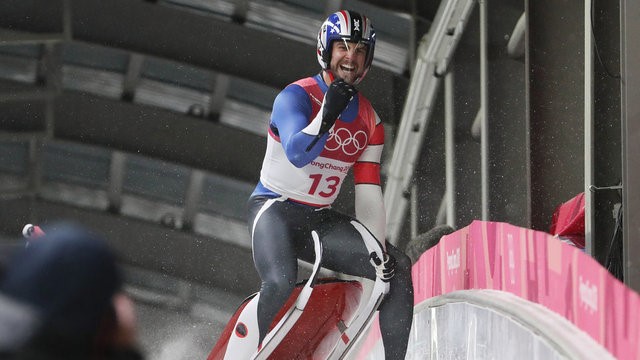
An Olympic medal of any colour had twice before dangled beyond Chris Mazdzer’s grasp – and to be fair, well beyond it. As a generalisation though, the Olympic format is one that represents his most auspicious shot at a podium finish. That’s because Chris is a man who excels in a contest of attrition.
“The conditions were really difficult,” Chris reflects. “The weather was below zero Fahrenheit, there was the windchill. And also in the US no singles man had ever medalled. So I know it’s been generations of luge athletes pushing for this. The Olympics is different in luge – typically it’s a two run race but at the Olympics it’s four runs. So after the first two I was actually in fourth place by only three thousandths of a second. If it was a normal World Cup race I would have been really upset to be off the podium by that much! But given the opportunity – I’m a consistent slider, I have experience – four runs for me really helped out just because some of the other guys messed up on the second day.”
Success at Pyeongchang has transformed Chris Mazdzer into something of a national hero. Google him and you’ll find countless images of the photogenic slider bedecked in stars and stripes or else with dance partner Witney Carson, alongside whom Chris competed in the national series Dancing with the Stars. In fact following Pyeongchang Chris Mazdzer has become exactly that – a star.
Never mind all the proceeding clamour though. It was nothing compared to the sensation that started it all: winning Olympic silver.
“To walk away with the silver medal,” Chris says, “it was really emotional for me. Like I had this idea as a kid growing up, my goal was to obviously win an Olympic medal. And you kind of envision what that would be like but the truth is, when it actually happened it was way more emotional because of all of the years of struggle and sacrifice that my family made, my friends made, my coaches, my competitors, my team mates made. It was way more powerful and profound than I ever thought it was going to be. It just felt really good to give back with a tangible item. Like, the coach who was the first one to tackle me and give me this huge hug – like, bang – we were team mates for many years and so he missed the spot on the podium. Having old team mates support me like that, it’s absolutely incredible that we finally did this so yeah, it was way more emotional than I ever thought it was going to be.”
The commitment from Chris’s coaching team is not lost on him.
“They gave everything in their careers, and then went on to coaching. I mean, they’re still giving me a hundred percent and that’s what makes it absolutely incredible.”
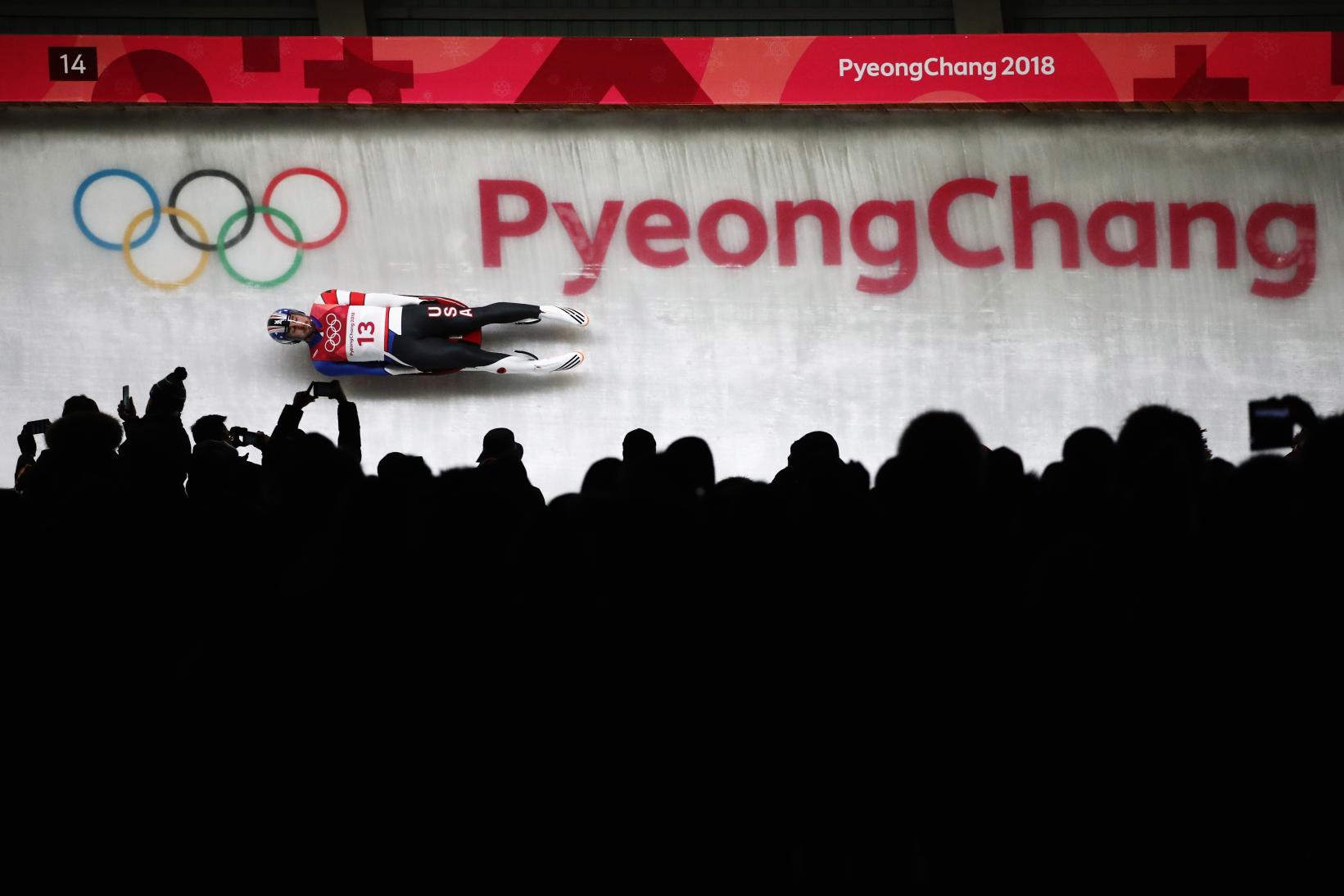
Likely, Chris Mazdzer’s life will never be quite the same following his historic silver medal. In the States he has become a household name. And that’s a feat not common for a luge athlete.
“Not at all!” he agrees. “It’s been really insane. I think for luge it was a perfect storm of events. The night of the final luge competition there were high winds so actually all of the skiing was cancelled so the only event on at the time was luge, so you had the entire country tuning in to the men’s luge race and I mean it was thousandths of a second – I missed gold by 26 thousandths of a second – how exciting is that? So it just ended up being one of the best races we’ve ever had on the biggest stage. I mean I almost came out on top, just 26 thousandths of a second away. And yeah, it’s been crazy. I went on Dancing With The Stars; I mean if you were to tell me a year ago, you are going to win an Olympic medal or be on Dancing With the Stars, I would’ve said with 99% confidence: you’re crazy. I never, never would’ve imagined it, it’s been pretty wild.”
As spectacular as that achievement was, the event is in the past, even if the effects and, justifiably, glory, remain. It’s time to look forward and just because there’s no snow on the ground doesn’t mean Chris can ease off. Presumably there is work to be done.
“You’re absolutely right – there’s a lot of strength and conditioning that goes in during the summer. Directly after the season is where we have our time off, so our season typically ends in March – although we’ll actually go back to Lake Placid and do some testing. We’ll take basically the month of April off so from May 1st on we’re on the strength and conditioning program. We go to Lake Placid which is where our headquarters are based out of. They have an indoor ice-start facility so we’ll practise ice-starts there. And when you’re in Lake Placid it’s a full day. You wake up, warm up, do starts, sports med, rehab, strength and conditioning, plyo, agility.”
It’s not just about fitness though. There is engineering to be considered.
“Even in the summer we’re still working on our sleds and getting our equipment set up for next year. Next week I’m actually going to a wind tunnel in San Diego to do some aerodynamic testing so it’s full time, year round. It’s just in the winter you wake up at seven in the morning and you go till nine at night. It is literally a twelve-plus hour day every day in the winter. In the summer they’re usually half days, but you can still have full days. This is the first summer where I’m spending a lot of time in Salt Lake City, away from Lake Placid, but typically the whole team, they’re in Lake Placid at least two weeks every month. Some people stay there full time. Let’s just put it this way, from June 2015 to June 2018 – so for the last 3 years – there were only three times where I spent more than two weeks in a single location before flying or driving to another country. We are always on the road travelling. It’s pretty intensive.”
It’s an annual cycle that Chris has been engaged in for the better part of two decades. That kind of passion is perhaps easier to envisage in trendier sports like skiing and snowboarding. Luge on the other hand – maybe sliding sports in general – doesn’t attract such attention among youth athletes.
“Absolutely right. Luge is a small sport but I got into luge because I loved sledding. A lot of people go sledding in the winter and that’s just kind of a form of luge – the very basic form. But what’s really funny is that I’m actually the only person on this past Olympic team that grew up close to a luge track. Typically in the US we do this recruitment where we put wheels on street luges, so we do this street luge tour across the country and you pick kids up that way. But I actually got involved because I love sledding and at eight years old there was a little local program in Lake Placid. I lived about 45 minutes away in Peru, New York, and it was ultimate sledding – luge was the largest sledding hill that I could go down. I was given the option between bobsled and luge and the problem with bobsled was, you’re only driving half the time, the lines are longer, the turnover’s slower so you would only drive one or two runs a night whereas with luge – I was a little ADHD kid, I was all over the place – I would run back to where we started from the finish and get up to nine runs a night. So that’s how I got into luge: more bang for your buck!”
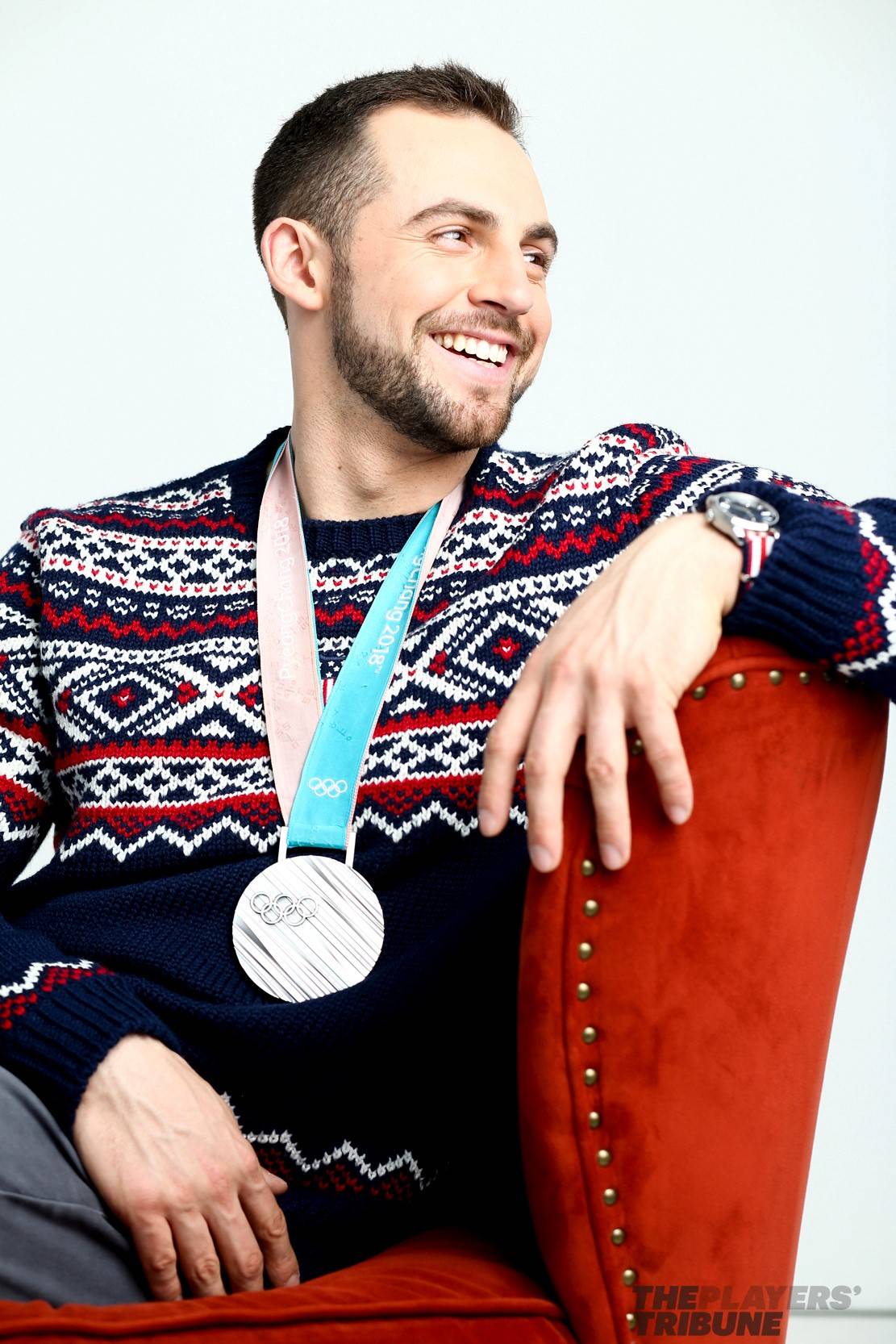
That eight year old kid from Peru, New York has come a long way and now finds himself an inspiration, hopefully, to a new crop of sliders. It’s easy to assume that his own sources of inspiration are the Olympic stars of years gone by, the household names of winter sport, but Chris Mazdzer found his motivation closer to home.
“It’s gonna be hard to pass on this message, but I think the people who inspire me were my older team mates while I was growing up. No one’s going to know Bengt Walden. Very few people are going to know Tony Benshoof. But they were my team mates when I was younger on the team and just seeing their struggle and how they persevered – even though we were going up against people who had better equipment – just to see the dedication and the commitment that they gave, knowing what they were going up against. You know, it was like a David vs Goliath story a lot of the time. And to see that determination out of them was really motivating for me personally, so I think I was really lucky. I had fantastic team mates and even though I do an individual sport, they were really good at making it a team environment. It wasn’t like an individual sport, it was like the few of us versus the rest of the world. And I think that seeing that dedication, especially from my team mate Bengt, was motivating for me. Like he was always in the gym, he was always doing the right thing; he had his goals and his priorities set. It’s funny, right before races sometimes if I’m struggling I’m like, ‘You know I’m messing up here and here and this and this is an issue,’ and they’re always like, ‘Chris, you’re gonna be fine in the race, you always figure it out,’ and I’m like, ‘That does not help me out right now!’ But somehow I pull it off a lot – I don’t know exactly why. But I think for me, it’s not like I look up to these major professional sports players and really idolize them. I think for me it’s the amateur sports, seeing athletes who will work forty hours a week, who go to school, yet also compete at the world cup level. I think those are the athletes and the people who really inspire me to do more and to be better, because guess what – somehow they’re getting all of it done against all odds. And they’re performing to the best of their ability. I had this really unique upbringing where it wasn’t like my self identity was based 100% on results; my self identity growing up was what I can give back, how well I can represent my teammates, how well I compete and execute what I’m trying to do. I guess it’s just a little bit of a different mentality that I had growing up: it wasn’t like the biggest people in the world that I was looking up to. It was the people who were getting fourth place, fifth place, but yet they were doing all of these other amazing things against all odds. That’s really inspirational. Up to the age of twenty five I was working full time as a bartender. Basically on the weekend I would go to the Whiteface Lodge and thirty six hours later I would walk out completely exhausted but that’s how I’d make money in the summer and then head right back to training. And I kind of got that from my older team mates who had all these side jobs. They were just able to make it work.”
They made it work but at some point, Chris points out, everyone will fail at something. Because if you ask for his advice on making it as a top luge athlete, there’s no sugar-coating the pill.
“I don’t want to sound negative here but you will run into adversity. You will fail at your goals and it’s all about your attitude in getting right back up and trying again. Every day is not going to be a great day – that’s the hard truth when it comes to luge. There are so many variables that are outside of your control when it comes to weather, when it comes to your sled. You’re going to have to weather a lot of storms. Never give up, even when you feel like giving up – and that can last for months unfortunately. It really can be this negative spiral when your equipment and yourself are not running correctly. But what I think is amazing is that when you do weather these storms you come out so much stronger, because it’s not the fact that you’re not trying. You’re trying 100%, you’re just not getting the results. But once everything clicks, because you’ve been working so hard, you just come out that much better. I guess my advice is, you are going to fail at some point and it’s all about your attitude and staying with it and if you can weather that storm you’re going to come out so much stronger and have a much better appreciation for where you were. Have a great attitude and never give up.”
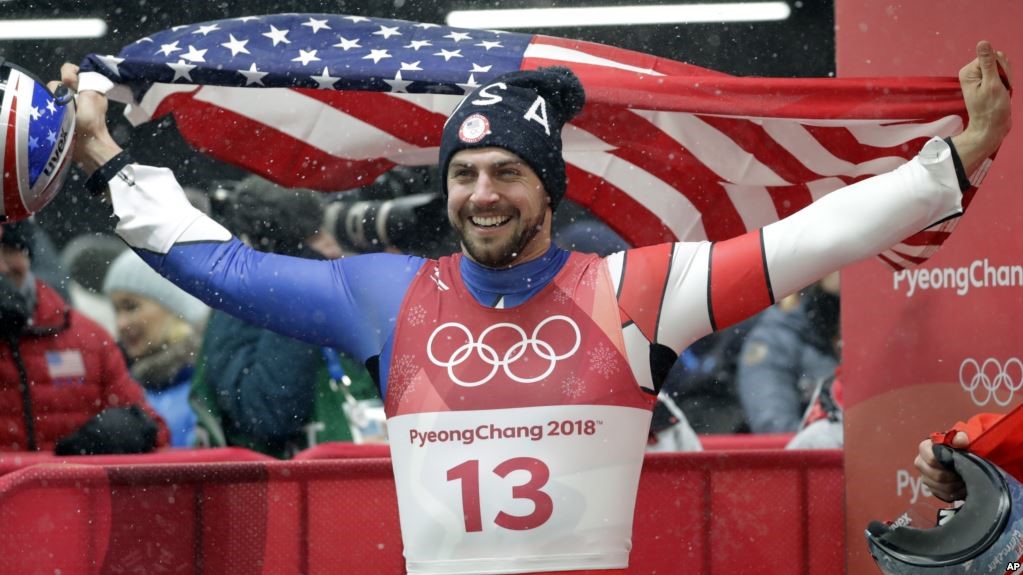
Having an understanding of the annual cycle of training and competing, and how many years he’s been plugging away at it for, it’s easy to view Chris Mazdzer as the epitome of determination. And it’s not just about this season, or the next one. There’s a four year cycle in elite-level sliding and it culminates with the greatest sports show on earth.
Is Beijing 2022 on the cards?
“My goal is to be twenty-seven thousandths of a second faster in Beijing! I’m going to go for four more years. I hope to continue to be the chair athlete representative of luge. I’ve really enjoyed that position in life, making the sport a better place when I leave it, so I definitely want to continue 100%. But this’ll be my last quad, the last four years that I’m in this sport. And it’s kind of nice knowing that, just so that I can create a life for myself outside of this sport. Because you know what, when luge ends, it really ends! Unless you want to be a coach or work in the luge organisation, there’s not really a good job placement opportunity based off of sledding. So the next four years are going to be a transition for me into the professional world but I’m also really excited to continue and to basically leave this sport a better place than I found it, and that’s the goal over the next four years. And I also wanna kick ass and be the best. So, I’m right back to training!”
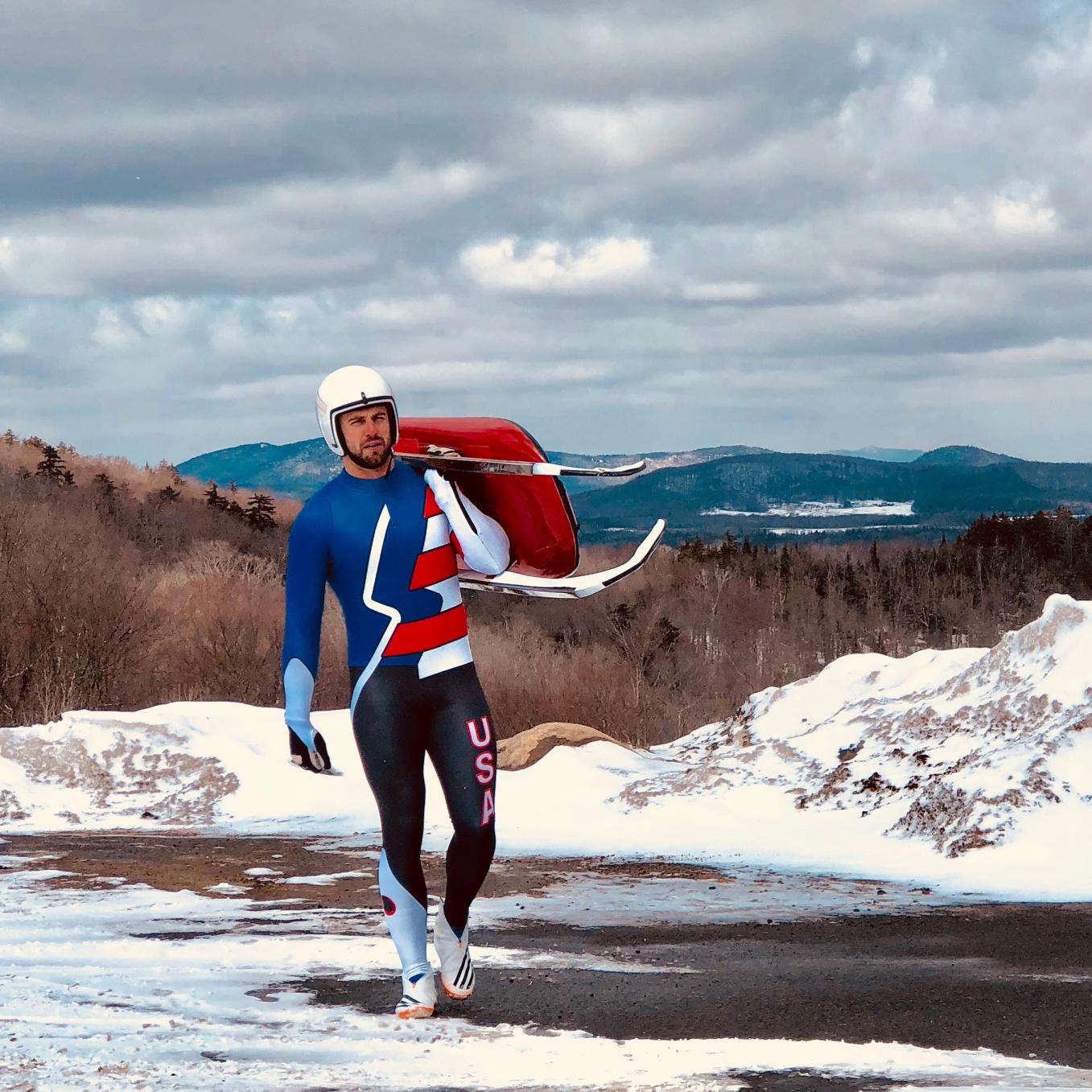
My grateful thanks to Chris Mazdzer for his time. You can keep up with Chris and his ups and downs – and there will be both, you can be sure of it – during his final four year cycle at the following feeds:
Chris Mazdzer Website: chrismazdzer.com
Chris Mazdzer Twitter: @mazdzer
Chris Mazdzer Instagram: @mazdzer
Chris Mazdzer Facebook: /ChrisMazdzer
Related article: Laura Deas
